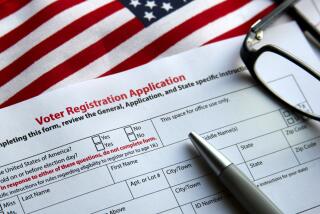Cracking Down on Stacking the Deck in Bosnia
- Share via
BRCKO, Bosnia-Herzegovina — A couple of thousand Bosnian Serbs stood forlornly in the afternoon sun the other day. With neatly drawn placards, they protested decisions of international monitors that the Serbs believe will deprive them of the right to vote.
“We found shelter here in Brcko,” cried Milorad Zivlak, one of the leaders of the rally, “and now they won’t let us vote in our town. “
The international officials see what is happening in Brcko in a different way. They believe that they have caught nationalist Bosnian Serb politicians in a case of “overwhelming” fraud designed to inflate Bosnian Serb voting rolls in this strategic and hotly disputed city before next month’s local elections.
As punishment, three of the Serbs’ leading candidates in Brcko were thrown out of the race and 3,270 citizens were denied registration. They can, however, vote in their prewar hometowns, cities that are now under Muslim-Croat control and from which they fled.
Officials of the ruling Serbian Democratic Party, or SDS, loyal to indicted war crimes suspect Radovan Karadzic, were supplying false identification papers to Serbs trying to register to vote in Brcko, according to an investigation by the Organization for Security and Cooperation in Europe, or OSCE, which is supervising elections in Bosnia-Herzegovina.
Under the rules, refugees can vote in the cities where they now reside if they can prove that they have lived there since July 31, 1996. The OSCE found that Bosnian Serb police were helping Serbs in Brcko falsify addresses and backdate their identifications.
The “local media suggested that residents who did not register were ‘traitors’ and would suffer unspecified negative repercussions,” the OSCE said in its ruling.
Bosnian Serb nationalists want as many Serbian voters as they can get in Brcko to be able to maintain control of the conquered city. Brcko was 70% Muslim and Croat before Bosnian Serb militia expelled and killed non-Serbs at the start of Bosnia’s war in 1992. The city has been filled with Serbs displaced from elsewhere in Bosnia, but banished Muslims and Croats can still vote.
Bosnian Serb leaders were furious at being punished.
“They [international officials] will desperately do anything to keep our numbers small,” said Mladen Bosic, head of the SDS in Brcko and one of the candidates jettisoned from the race. “It is an unfair and deliberate attempt to influence the future of Brcko.”
Bosic, interviewed over coffee at his office, which was covered with Karadzic posters, said the Serbs are contemplating a boycott of the elections as a way to discredit the poll.
Western officials make no secret of wanting to restore an ethnic balance to Brcko’s government. If non-Serbs are represented at City Hall, then eventually non-Serbs can come home. Or so the theory goes.
By most accounts, Serbs will be able to take slightly more than 50% of the vote--maybe more. Brcko, strategic to the Serbs because it ties together the eastern and western halves of their Republika Srpska, is now under special international administration, with a U.S. diplomat serving as supervisor.
The Brcko fraud and the threatened boycott are typical of irregularities and obstacles that have plagued the run-up to the much-delayed Sept. 13-14 vote. One difference over last year’s grossly flawed national election, however, is that the OSCE is taking more forceful actions to punish the offenders and clean up registration and other preparations. A total of 42 candidates--30 Serbs, 10 Croats and two Muslims--have been thrown out of the race as punishment for various party infractions.
Whether the measures have been enough won’t be known until complete voter registration figures are released, analysts say, and the OSCE is refusing to do that. OSCE spokesman David Foley said that making public a breakdown of the voter rolls would “play into the hands” of hard-line nationalists who want to manipulate the results.
Other preparations for the September vote, considered a crucial step in Bosnia’s postwar development, are woefully inadequate. Little progress has been made in building a free press or alternative political expression. “There is improvement over last year, but political conditions are still not anywhere near minimally free and fair,” said Hrair Balian of the watchdog agency International Crisis Group.
(BEGIN TEXT OF INFOBOX / INFOGRAPHIC)
Voting Fraud Case
International officials believe that they have caught nationalist Bosnian Serb politicians loyal to war crimes suspect Radovan Karadzic in a case of “overwhelming” fraud designed to inflate Bosnian Serb voting rolls in Brcko before next month’s local elections.
More to Read
Sign up for Essential California
The most important California stories and recommendations in your inbox every morning.
You may occasionally receive promotional content from the Los Angeles Times.











